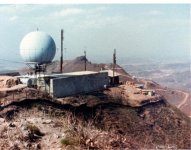Sistema1927
US Veteran
Once again, my service is post-Vietnam, but your latest of the ride in the slick triggered a memory. I won't use names to protect the guilty, but I made friends with a helicopter pilot in Korea, and if I had to go from Taegu to Seoul I would try to snag a ride with him since it was a far sight better than making the trip in a Jeep.
On one trip, we did a little sightseeing. I was wearing a harness and leaning out the open door taking in the sights while wearing the crew chief communication helmet. At one point, I asked the pilot what those orange panels on the ground were. He said " Oh, scat", and threw the Huey into a hard turn. I thought that the harness was going to give way with the added stress on it.
When we landed, I asked him what they were, and he told me that they were markers for the DMZ. We had gotten a little off course with the sight seeing. It also explained why folks on the ground were a bit quizzical that a bird from Taegu approached the field from the north.
On one trip, we did a little sightseeing. I was wearing a harness and leaning out the open door taking in the sights while wearing the crew chief communication helmet. At one point, I asked the pilot what those orange panels on the ground were. He said " Oh, scat", and threw the Huey into a hard turn. I thought that the harness was going to give way with the added stress on it.
When we landed, I asked him what they were, and he told me that they were markers for the DMZ. We had gotten a little off course with the sight seeing. It also explained why folks on the ground were a bit quizzical that a bird from Taegu approached the field from the north.







